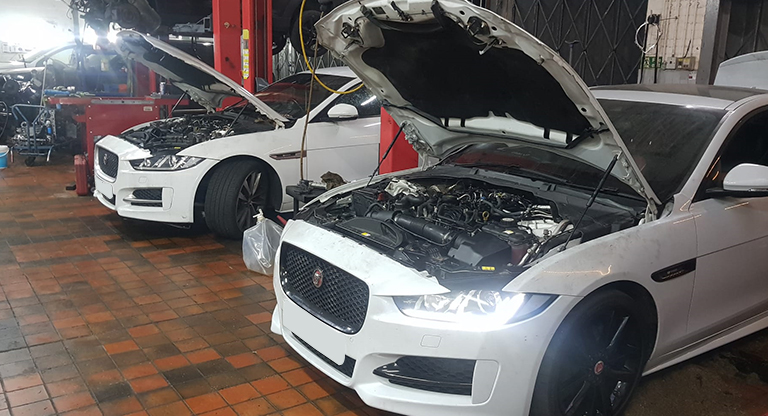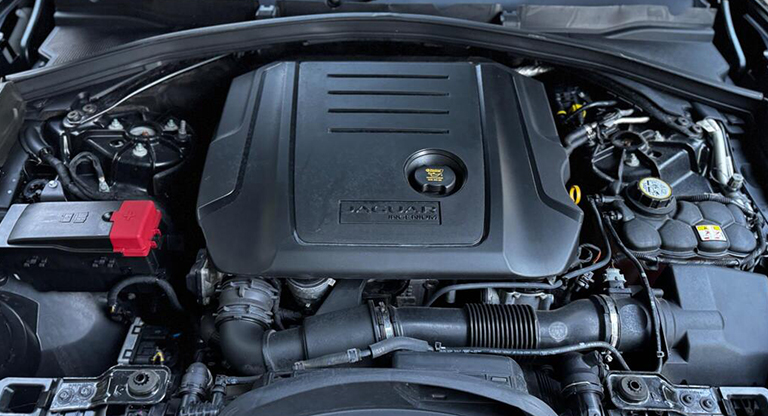- September 18,2025
Most Common Jaguar F Pace Engine Problems That Every Owner Should Know
Modern Jaguars deliver luxury and performance, yet even premium cars need careful maintenance. The Jaguar F-PACE, the brand’s first SUV, uses the company’s Ingenium engines and offers both diesel and petrol power. Owners sometimes overlook early warning signs until a small problem becomes expensive. This blog explains the top 10 common engine failures you shouldn’t ignore. It is perfect for people considering a Jaguar F Pace engine for Sale or seeking advice from a Jaguar Engine Specialist. Knowing what to expect and acting quickly can keep your F PACE running smoothly and help you decide which engine suits your needs.

1. Timing Chain Failure (2.0L Ingenium diesel)
Early 2.0 litre diesel F PACE models sometimes suffer premature timing chain wear. These chains can stretch, and if not replaced in time, the chain may jump or snap, causing pistons to hit valves and destroying the engine. Stretching is often linked to oil dilution from incomplete diesel particulate filter (DPF) regenerations and insufficient oil changes. A telltale symptom is a metallic rattling noise during cold starts. Ignoring the noise can lead to catastrophic failure, so seek diagnosis immediately if you hear it. The only cure is to fit new chains, guides, idlers and tensioners.
2. Turbocharger Issues On 2.0l Diesel
Turbo failure is another issue reported by F-PACE owners. Both single and twin turbo diesel models can develop turbo problems early in their life; symptoms include a high pitched whistle before failure and sudden entry into restricted performance mode. Replacement turbos require a full clean of the engine, oil supply and exhaust system to prevent repeat failures. Regular oil changes and prompt attention to loss of boost can help prolong turbo life.
3. Piston Cooling Jet Solenoid Failure
The 2.0 litre diesel engine uses a solenoid to manage oil flow to piston cooling jets. When the solenoid fails, usually because coolant leaks from the thermostat housing onto its electrical connector, the engine can overheat. Replacing the faulty solenoid and stopping the coolant leak are necessary to protect the pistons and maintain stable temperatures.
4. Throttle Body Blockage On 3.0 Litre Diesel
On 3.0 litre diesel models, the throttle body can block up, triggering a restricted performance message. If the blockage is ignored, it may prevent DPF regeneration and eventually block the filter. Replacement of the throttle body is straightforward and prevents secondary issues.
5. Inlet Manifold Or Rocker Cover Leaks
The 3.0 litre diesel also suffers from inlet manifold or rocker cover leaks. Plastic manifolds can crack, triggering restricted performance messages, especially during acceleration. Repairs involve replacing gaskets or cracked manifolds to restore proper sealing.
6. Crankshaft Failure In The 3.0 Litre V6 Diesel
Some F-PACE models with the 3.0 litre V6 diesel experience crankshaft issues. It includes spun main bearings, oil starvation of the bottom end or even snapped crankshafts. Symptoms range from knocking noises to a completely seized engine. If this happens, the cost of a rebuild often makes a replacement engine the only practical solution.
7. Water Pump & Coolant Hose Common Problems On Supercharged Models
Supercharged 3.0 and 5.0 litre F PACE models use water pumps prone to early failure. Coolant can enter the pump’s bearing housing, corroding the bearing and allowing water to escape. Owners may see a low coolant warning and traces of a leak near the pump. The pump sits at the front of the engine, making replacement easier than on some cars; specialists also replace the small plastic coolant pipe at the same time because its connectors often break during removal. In addition, the plastic coolant hoses on these engines tend to crack with age, so replacing all hoses at once avoids repeated failures and repair bills.
8. Short Driveshaft On Early 2016 Automatic Models
Early automatic F PACE models produced up to mid-April 2016 may have been fitted with a driveshaft that is too short. According to specialists, the shaft can fall out and disable the drive. Replacing it with the correct length driveshaft resolves the problem.
9. Oil Dilution And DPF Related Fuel Contamination
Oil dilution is a key concern for Ingenium engines. Fuel can enter the sump during active DPF regeneration cycles, contaminating the oil and reducing its ability to lubricate. This dilution is common during short trips and stop-start driving. Reduced oil viscosity leads to increased wear on bearings, camshafts and pistons. The problem is linked to the regeneration cycles required to burn off soot in the DPF. Passive regeneration occurs at high temperatures when the engine is running hard; active regeneration injects extra fuel into the engine to raise exhaust temperatures. If the vehicle regularly performs short journeys, it relies on active regeneration, and excess fuel can seep past the piston rings, diluting the oil. To mitigate the risk, specialists recommend shorter oil change intervals and using the correct oil grade.
10. Timing Chain Wear, Misfires And Noise On All Ingenium Variants
Although the 2.0 litre diesel timing chain is the most notorious, the Ingenium family’s timing chains can wear across variants. Automotive experts note that the chain can stretch prematurely due to improper lubrication and general wear. As the chain loses tension, it affects synchronisation between the camshaft and crankshaft, leading to misfires and inefficient performance. A distinct metal-on-metal rattle during start up is an early warning sign. Ignoring the noise may result in chain breakage or teeth jumping, causing internal damage. Regular monitoring and timely replacement help maintain engine health.
FAQS
1- What engine does the Jaguar F PACE have?
Depending on the model year, the F PACE offers mild hybrid diesels D165 (163 PS), D200 (204 PS) and D300 (300 PS); mild hybrid petrol engines P250 (250 PS) and P400 (400 PS); a plug-in hybrid P400e with 404 PS; and a 575 PS supercharged V8. Early models also used non-hybrid Ingenium 2.0 litre petrol and diesel engines.
2- Which Jaguar F-PACE engine is best?
There is no universal “best” engine; it depends on your needs. The D200 mild hybrid diesel balances power and efficiency. The P400 mild hybrid petrol offers strong performance without plug-in charging. The P400e plug-in hybrid provides electric only running for short commutes and low company car tax. Always match the engine to your driving patterns and maintenance preferences.
3- Who makes the Jaguar F-PACE engine?
Jaguar’s Ingenium petrol and diesel engines are produced in the UK at the company’s Engine Manufacturing Centre in Wolverhampton.
4- How long should a Jaguar F PACE last?
With regular servicing, correct oil and coolant, and prompt attention to warning signs, these engines are designed for a long lifespan. Avoid long intervals between oil changes, complete DPF regenerations on diesels, and address any rattles quickly to prolong life.
5- What is the best year for the Jaguar F PACE?
Later models benefit from improved timing chain parts, software updates and more powertrain choices. For buyers prioritising reliability, look for MY2018-on cars with updated chains and the most recent service history.
6- Is the Jaguar 2.0 Ingenium engine reliable?
The Ingenium family delivers strong performance and low emissions, but early 2.0 litre variants faced timing chain stretching and oil dilution issues. Later engines feature improved chain designs and calibrations. Reliability depends on maintenance and driving habits.
7- Is the Jaguar F PACE engine reliable?
Generally, yes, if serviced on schedule and updated with the latest software. Be aware of timing chain noise, turbo health and oil dilution; addressing these promptly keeps the engine reliable.
8- What is the timing chain problem with the Ingenium engine?
The Ingenium timing chain can stretch prematurely. Stretching compromises tension, affecting synchronisation between the camshaft and crankshaft and causing misfires. A metal-on-metal rattle during cold start is an early warning. Ignoring it can lead to the chain snapping and severe engine damage.
9- Is it worth buying a used or reconditioned Jaguar F PACE?
Yes, if you choose carefully. Insist on a complete service history, look for evidence of timing chain replacement on early diesels and ensure oil change intervals match usage. A reconditioned engine from a specialist with upgraded parts can be a cost effective option.
10- How much to replace the timing chain on a Jaguar F PACE?
Costs vary by engine and labour time. Because parts and rates change, get written quotes from UK specialists and confirm that updated chains and guides are used. Never drive with a failing chain to avoid further damage.
11- What is a common issue with the 2.0 litre Ingenium turbo I4?
The most common issues are timing chain wear and oil dilution. Chains may stretch and rattle, and diesel variants can suffer from fuel contaminating the oil. Regular maintenance, correct oil and shorter service intervals help mitigate these problems.

